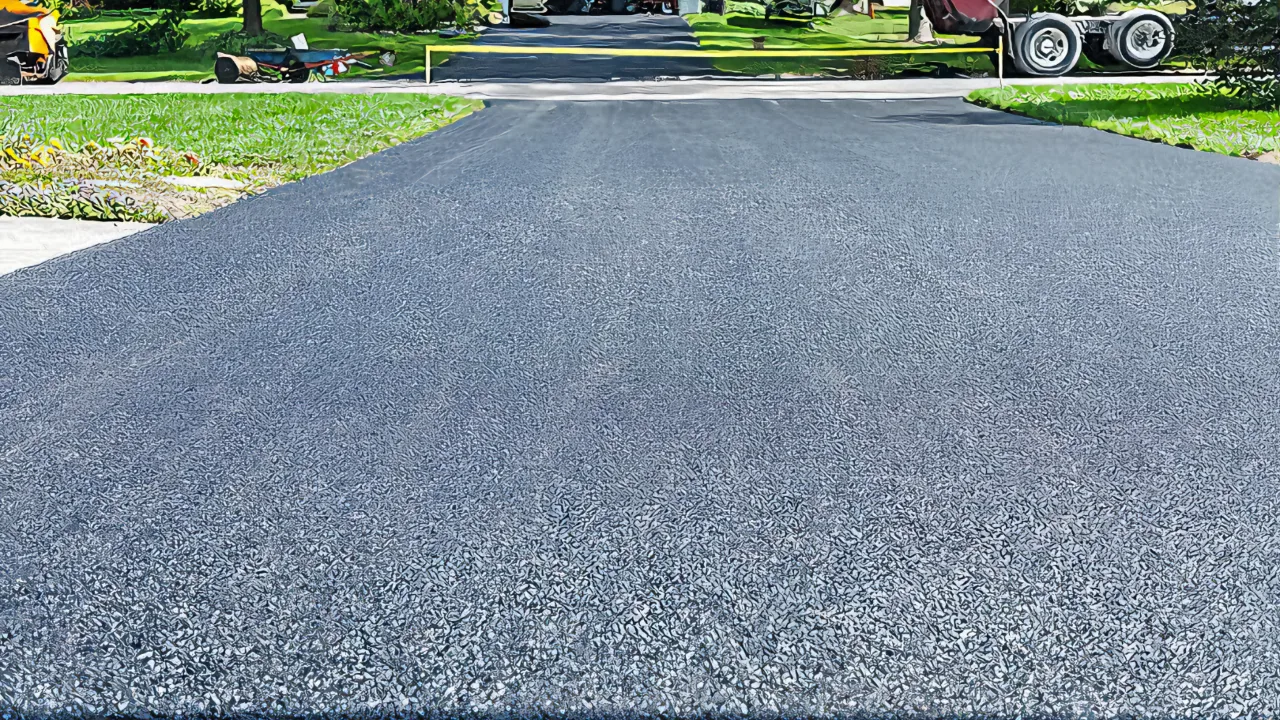When you’re planning to pave a driveway, parking lot, or even a long stretch of pike, one of the first questions will comes to your mind is: “How much asphalt do I need?” That’s where our asphalt calculator comes into play. It saves you time, money, and a lot of headaches. Enter unit values to calculate asphalt/tarmac/bitumen/blacktop in volume (cu ft, cubic yards, or cubic meters) and weight (tons, tonnes, kgs, and lbs) you require for your project.
Hot Mix Asphalt Calculator
Calculate the exact amount of hot mix asphalt required for your paving project. Enter your project's dimensions below:
- Why is Accurate Asphalt Quantity Calculation Important?
- How Much Asphalt Do You Need?
- Types of Asphalt
- How to Calculate Asphalt Mixture Requirements
- Important Factors That Impact Bitumen Quantity
- Pike's Law of Asphalt Estimation
- Cost Considerations When Buying Asphalt
- Environment and Durability
- Tips for Working with Contractors
Why is Accurate Asphalt Quantity Calculation Important?
Ever have a ride on a freshly paved pike or stood on a new driveway? You’ve experienced the greatness of quality asphalt. Asphalt is a durable, waterproof material made from bitumen (a petroleum byproduct) mixed with aggregate like gravel or crushed stone.
It’s important to understand why accuracy matters when estimating how much asphalt you need. Asphalt is sold by weight (usually in tons or tonnes, depending on your region), not by feet or meters, and ordering too little means project delays, while buying in excess costs you a lot. The asphalt calculator can help you figure out the exact amount for your project dimensions.
Asphalt pavement projects require planning because the material hardens quickly once it cools. Unlike other construction materials, hot mix asphalt (HMA) can’t be stored for future use, so accuracy is important for a successful project. Further, most suppliers charge delivery fees per trip so consolidating your order saves you money.
How Much Asphalt Do You Need?

To estimate the required amount of asphalt, you need to consider three basic dimensions: length, width, and thickness (or depth). For example, if you’re paving a foot path that’s 100 feet long, 10 feet wide, and 2 inches thick, calculating manually can be complicated. Instead, use the bitumen calculator to find out the volume of tarmac needed, and from there, the weight in tons.
You also need to account for compaction – the process where the asphalt is compacted to remove air voids, making the pavement denser and stronger. That’s why it’s a smart move to order 5-10% more blacktop than your base estimate.
Types of Asphalt
Choosing the right blacktop is crucial to get the performance and longevity you want out of your new surface. Here are the asphalt types depending on the different mixtures:
- Hot mix asphalt (Dense-graded mix) is the most common and widely used for everything from residential driveways to major highways. It’s durable, flexible, and performs well in all weather conditions. However, it must be installed when hot (usually around 300°F), so timing and equipment are critical.
- Warm mix asphalt is similar to hot mix but produced at lower temperatures. It’s a bit easier to work with, especially in cooler climates or on projects where environmental impact is a concern. Warm mix is a good option for eco-friendly projects or when paving schedules are tight.
- Cold mix asphalt, on the other hand, is often used for patching potholes or smaller repair jobs rather than full-scale paving. It’s not as strong or long-lasting as hot or warm mixes, but it’s highly convenient. You can use it straight from the bag without heavy machinery or high temperatures.
- Open-graded mix has larger aggregate pieces with fewer fine particles for better drainage and water permeation.
- Stone Matrix Asphalt (SMA) is a premium mix with higher durability used for high-traffic areas like a highway where longevity is key.
When it comes to choosing the right kind of asphalt for your project, you need to think about four main factors: the size of your project, the expected traffic load, the climate, and your budget. For a small, private driveway where you’re just patching up a few spots, cold mix will be better. But for a new parking lot or driveway that needs to last for years, hot mix asphalt is usually a good investment.
The density of those mixtures can vary, which affects the weight and volume calculations. Standard asphalt concrete has a density of around 145-150 pounds per cubic foot. Your contractor might use slightly different figures depending on their specific mixture.
How to Calculate Asphalt Mixture Requirements

To calculate how much asphalt you need, start by figuring out the length and width of the area you want to pave. For a rectangular space, multiply the two dimensions to get the square footage. If you have an irregular shape, break it down into regular geometric sections and calculate each one separately. For example, a 50-foot-long driveway with a 12-foot-wide area would be 600 square feet.
The thickness of your asphalt layer depends on its intended use:
- Residential driveways: Usually 2-3 inches (5-7.5 centimeters)
- Parking lots: Usually 3-4 inches
- Roads and highways: Often 4-6 inches or more
That’s the compacted thickness, you can expect the material to be about 25% thicker before it’s compacted.
- Multiply your square footage by the depth (in feet) to calculate the volume of asphalt needed: Area (sq ft) × Depth (ft) = Volume (cubic feet)
- To convert to cubic yards: Volume (cubic feet) ÷ 27 = Volume (cubic yards)
- To convert volume to weight, multiply by the asphalt density: Volume (cubic yards) × Density = Weight
Asphalt is usually measured by weight rather than volume. The standard asphalt density is approximately 2,400 kg per cubic meter or 150 pounds per cubic foot. This means: 1 cubic yard of asphalt ≈ 2 tons of asphalt
Important Factors That Impact Bitumen Quantity
Estimating how much tarmac you project demand isn’t just about measuring the surface area. Many factors can influence the final quantity, and knowing them can help you avoid costly mistakes. Thickness requirements are a major factor. A residential driveway and a commercial parking lot don’t need the same thickness. Compaction also matters; asphalt loses about 20-25% of its original volume during compaction. You need to account for that when placing your order.
Moreover, if the ground underneath (the subgrade) isn’t stable, you might need to lay a thicker asphalt mat. The condition of the base below the asphalt affects both the required thickness and material performance. Poor subgrade may require additional asphalt or some preliminary work with gravel or crush and run aggregate. You should order 5-10% extra bitumen to cover any small errors or unexpected soft spots.
Finally, weather conditions affect a lot as well. On very hot or cold days, asphalt behaves differently, and crews may adjust the thickness slightly to account for rapid cooling or slow compaction. Temperature affects tarmac viscosity and workability. Areas that have high temperatures or extreme weather variations require special asphalt mixes with different densities.
Pike’s Law of Asphalt Estimation
An industry rule of thumb, sometimes called “Pike’s principle” says for every inch of thickness over 100 square feet, you’ll need about 110 pounds of asphalt cement and aggregate. This is a rough check of your more detailed calculations.
Cost Considerations When Buying Asphalt
Asphalt price varies with petroleum prices, location, and order size. Right now, it’s $85-$150 per cubic yard, depending on your area. Other factors that affect cost are:
- Delivery distance
- Minimum order requirements
- Special mixture requirements
- Do you recycle materials from the existing pavement
Many suppliers offer discounts for larger orders, so accurate estimation can help you negotiate better rates, especially for commercial projects like parking lots.
Environment and Durability
Modern asphalt mixes often have recycled materials, so their environmental profile is better. Reclaimed asphalt pavement (RAP) can be up to 30% of the new mix without sacrificing quality. The binder in asphalt affects its water proofing and durability.
When planning your project, consider these properties:
- Durability: Higher grade mixes may cost more but last longer.
- Drainage needs: Special mixes that allow water penetration may be necessary in some applications.
- Climate adaptation: Areas with extreme weather require special asphalt.
Tips for Working with Contractors
When talking to a contractor regarding your building project:
- Share your calculated estimates, but ask for their professional opinion.
- Ask what asphalt mix they will use.
- Discuss what the expected density of their mix is, and how that will affect your calculations.
- Ask how they will account for waste and compaction.
- Request a breakdown of costs per ton or tonnage
A good professional contractor should be able to explain any big differences between their estimate measurement and yours calculated using our asphalt/bitumen calculator.
Usama, Ali "Asphalt Calculator" at https://zeecalculator.com/asphalt-calculator from ZeeCalculator, https://zeecalculator.com - Online Calculators
